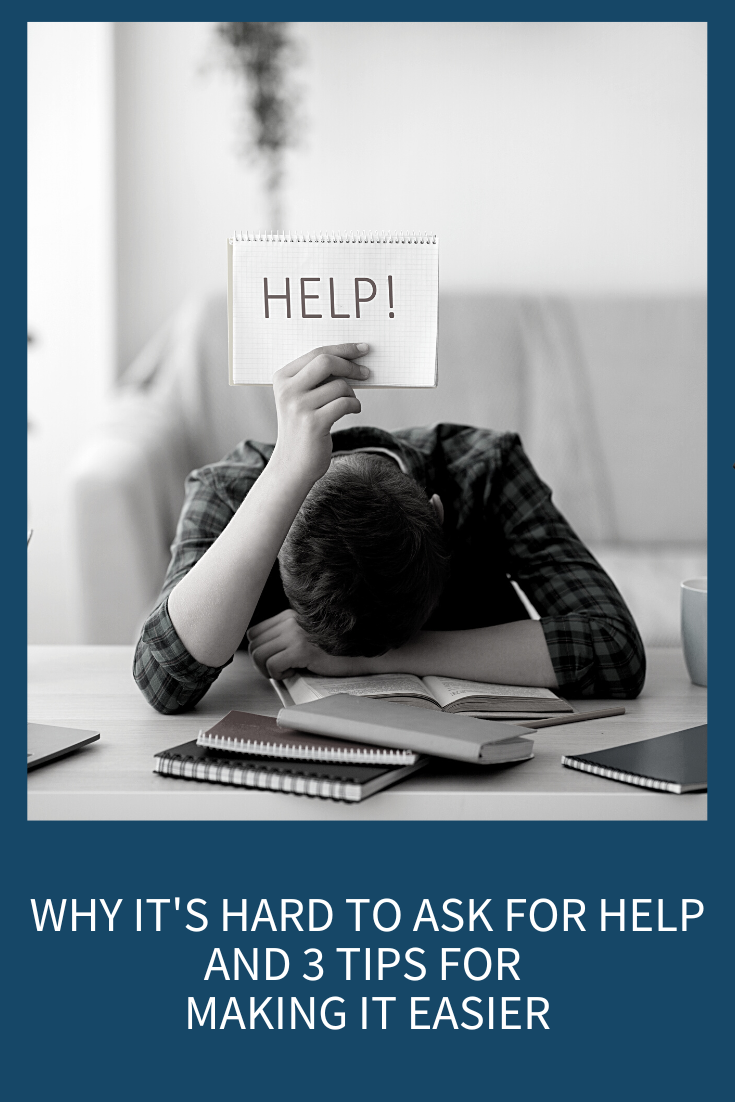
Hello. My name is Abby, and I hate to ask for help. Despite all my years of therapy and teaching others how important it is, asking for help is still something I find difficult to do and I know I’m not alone! Today, I’ll be sharing the reasons why it’s hard to ask for help, the research behind the benefits of doing it and my top three tips for becoming someone who asks and receives.
9-minute read
My new book just came out! The book! https://abbymedcalf.com/boundaries
Asking for help is good for you and the people around you. It strengthens relationships, helps people feel less alone and alleviates depression and anxiety. So why don’t we do it more often? Why do some of us suck at this?!
In my work, I’ve found five main reasons why people tend to “go it alone” and find it hard to ask for help.
Reason #1: You Believe You’ll Seem Weak
Some people are afraid that if they ask for help others will judge them and label them as weak, incompetent or inferior in some way. And here’s something scary, recent research has shown that kids as young as seven years old believe this, and it’s one of the main reasons they don’t ask for help!
Asking for help makes you feel vulnerable, but you might have the wrong definition of vulnerability. Being vulnerable isn’t being weak. Being vulnerable means you’re accessible to the people around you. It means they can access you, get closer to you and feel more connected, just like you do when someone is vulnerable with you!
Reason #2: You Don’t Want to be a Burden
I think this is at the core of my own issues in asking for help. For many of us, somewhere along the line in our childhoods, we were taught that we were being a burden if we asked for help. This might have been an overt message, or it might have happened because of something we assumed in our kid brains.
Reason #3: You Don’t Want to Owe Anyone
Even if the other person is super nice and assures you over and over that they were happy to help you when you asked, you might still be left with a feeling of owing them. This is because you grew up in a household where there was a lot of keeping score and tit for tat, so you bring these beliefs into your adult relationships. You were told somewhere in your growing up years that you owed people something if they did something for you or your family.
Then there are other times you ask someone for help, and they do it but then, a week later they throw it back in your face or complain about how they were put out by your request. You realize that their helping you wasn’t altruistic, and there are strings attached. So you stop asking for help because you don’t want them to hold this “nice” thing over your head until you pay them back in the future.
Reason #4: You See Yourself As Self-Reliant
You might have a self-concept that revolves around being self-reliant, independent and self-sufficient. You ask yourself, “If I’m those things, how can I ask for help? I don’t need it.” Once again, this generally traces back to your childhood. Somewhere along the way, being self-sufficient was given a lot of praise and it became your personality to handle things on your own.
In this case, asking for help would mean a loss of control of self and that’s immensely uncomfortable. You don’t like the feeling of putting your life in someone else’s hands, even for small things, so you avoid asking for help. You carry the burden of things on your own shoulders and see your problems or issues as yours alone.
Reason #5: You Don’t Think You Deserve it
Underlying all these reasons is a feeling of not being worthy of asking for help. You think that your worthiness is tied up in your doing: doing for others, being productive, working hard to bring home a paycheck or tirelessly taking care of a house and kids. You see your value in what you produce, and asking for help would diminish that. Somewhere you believe that the reason you’re worthy of someone’s love, time and attention is because of what you put out in the world, instead of who you are in the world.
Cultural Norms
I want to say a quick word about how cultural norms can also play a part in all this. Wayne Baker, PhD, who’s at the University of Michigan’s Ross School of Business, and the author of All You Have to Do is Ask, says, “Most Western societies like the US are very individualistic; self-reliance is the leading principle and while that can be beneficial, like anything, you can take it too far.”
In many Latin American or East Asian countries, which are more community-oriented or what we call collectivistic, asking for help can be more normalized and part of the culture, although even here, you’re not supposed to put your own needs before the needs of the group, so you can be someone who has difficulty asking for help no matter where you’re from.
The Truth About Asking for Help
Xuan Zhao, PhD, a social psychologist and research scientist at Stanford has found that people consistently underestimate other people’s willingness to lend a helping hand. Her research has found that people want to make a difference in other people’s lives, and it makes them feel good to be of service and help.
There’s a ton of research out there showing that most people, at their core, are incredibly prosocial. They want to have a positive impact on other people. In fact, people are often happier when they’ve participated in acts of kindness and compassion towards others. Again, the research shows consistently that people tend to overestimate the likelihood of their request for help being rejected.
How can we switch from going solo to inviting others in? Here are my top three tips (along with one bonus work tip).
Tip #1: Reframe
At its most basic level, something called cognitive reframing helps you look at a situation, person, thought or feeling from a different perspective. It’s a strategy that helps you open your mindset to a new point of view – a new angle on what’s happening so you can think differently about it and learn how to let things go.
This is crucial because you feel the way you think. So, changing your thinking about something will change your feeling about it. The thoughts you think and the subsequent emotions that you feel are almost always rooted in old, negative patterns that you’ve had since childhood. These ways of thinking and coping likely served you in some way then, but they definitely don’t serve you now.
When you get a new perspective on something by reframing, you can finally change those old patterns, gain control over your thoughts and feelings, and start feeling better! So, instead of assuming that asking your partner or mom for help is a burden on them, think of it as offering them an opportunity. It’s an opportunity to be closer to you. It’s a chance for emotional closeness and reciprocity.
Instead of thinking that asking your coworker for help is weak, think of it as allowing them to be part of the success of a project or issue. When you ask for help, you’re showing other people that you trust them, that you value them, which creates more connection and deepens any relationship. Remember, vulnerability means accessibility, not weakness. Instead of seeming like an untouchable and “perfect” person, you become more human, more approachable, which has people leaning in, instead of leaning out.
Another reframe could be that you remind yourself that you can never do as much alone as you could if you involved others. This ensures that things happen more smoothly, small things don’t get missed, and you have the capacity for more creativity when more minds are involved.
I lay out my five-step process for cognitive reframing in episode 158: how to stop overthinking and let things go that bother you so, make sure you check that out.
Tip #2: Remind Yourself of the Research
As I already said: most people want to help! We know from the research that not only do they want to help but, when they do, it promotes their feelings of happiness, increases feelings of connection and life satisfaction, while also raising their self-esteem. There’s even research showing that helping others helps us live longer! When you’re reticent about asking for help, remind yourself that study after study shows that asking for help will not only improve your life but also the people you ask.
Tip #3: Try the Reciprocity Ring
In his book All You Have to Do is Ask, Dr. Baker (who I mentioned earlier) suggests something he calls a reciprocity ring. You start by getting together a group of people; this could be at work, with friends, or family. Then, go around and have each person ask for something they need (big or small). Dr. Baker says that this activity helps normalize asking for help because everyone has an ask! I’ve used this with groups of executives I’ve worked with, as well as with a group of my girlfriends, and it’s amazing how great it feels as well as how many resources show up almost immediately.
Bonus Tip for Work
There’s also a way to ask for help using something called the SMART criteria. I’ve, personally, found this to be too formal for my personal relationships, but have found it very useful in work scenarios or with projects such as an auction being held at my kid’s school.
SMART is an acronym for a request that’s Specific, Meaningful, Action-oriented, Realistic, and Time-bound. So, before you ask for help, take a moment to make sure your request meets these criteria. You want to be Specific (and ask for exactly what you need), make it Meaningful (by sharing why you need it), Action-oriented (what information, resources or support would help you make progress on this ask), Realistic (what the other person can reasonably help with) and Time-bound (which would include saying when exactly you need this thing).
Research and Resources for Why it’s Hard to Ask for Help and 3 Tips for Making it Easier
My new book is out! Boundaries Made Easy: Your Roadmap to Connection, Ease and Joy. Pick up your copy here: abbymedcalf.com/boundaries
All You Have to Do Is Ask by Wayne Baker
Good, Kayla and Shaw, Alex. (2022) “Why Kids Are Afraid to Ask for Help,” Scientific American







